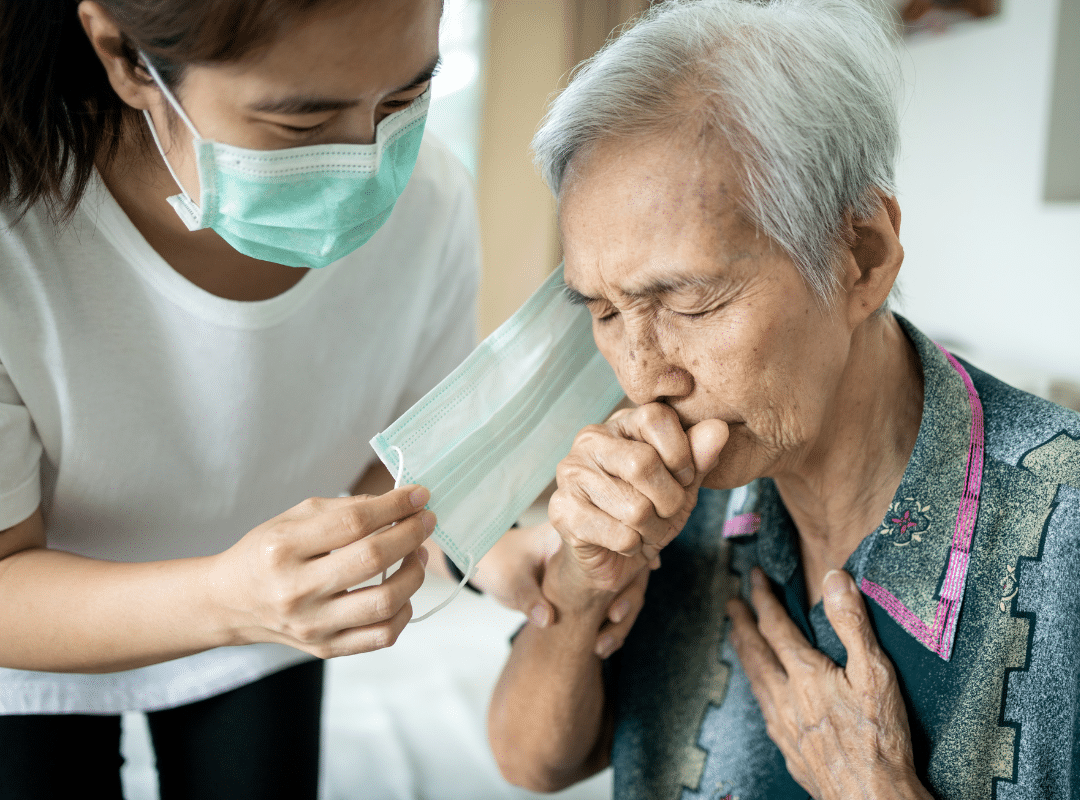Cough in the Elderly: Signs, Solutions, and Support Tips
Persistent cough in elderly individuals is more than a minor inconvenience; it can significantly impact daily life, comfort, and even indicate severe underlying health conditions. For many families and caregivers, understanding why a senior loved one is coughing frequently can be confusing and concerning. It may be tempting to dismiss a cough as a lingering cold, but in older adults, the causes can range from mild irritants to chronic diseases.
At The Westland House, we believe in providing comprehensive support and education to help families manage symptoms and ensure their loved ones receive proper attention and care. Whether it’s a dry cough in an elderly woman, an elderly person coughing at night, or a persistent case of coughing up phlegm, the key is understanding the cause, treating the symptoms, and ensuring comfort and quality of life.
Understanding Acute and Chronic Cough in Seniors
When you think about coughs in seniors, it’s essential to understand that they can be categorized into two types: acute and chronic, each with distinct causes and implications. Acute coughs usually result from infections and typically resolve within three weeks. Chronic coughs, on the other hand, persist for eight weeks or longer, often indicating underlying health issues. The cough reflex in seniors may be weaker, making it essential to identify the cause for effective treatment. Addressing both types of cough is crucial, as untreated coughs can lead to complications such as fatigue and rib fractures. Additionally, 24/7 care can provide vital support in monitoring and managing cough symptoms, ensuring that seniors receive timely medical attention. By recognizing the signs early and seeking appropriate medical advice, you can help ensure that seniors receive the care they need to breathe more easily and maintain their quality of life.
Common Causes of Cough in Elderly Individuals
Why do the elderly cough so much? There are many reasons, and understanding them is vital to finding relief. Common triggers include respiratory infections, such as pneumonia and bronchitis, which are more common in seniors with weakened immune systems. Other causes include chronic conditions like asthma or COPD, which often worsen with age.
Post-nasal drip from sinus issues or allergies, as well as gastroesophageal reflux disease (GERD), are other potential culprits. Medications, especially ACE inhibitors prescribed for blood pressure, can also cause a chronic cough.
Addressing these root causes is essential; caregivers can explore financial resources to access the necessary medical care and treatment.
Impact of Cough on Daily Life and Wellbeing
A persistent cough in elderly individuals can severely affect day-to-day life, leading to sleep disruptions, fatigue, emotional stress, and social withdrawal. Even the most minor activity can feel overwhelming when coupled with chronic coughing.
Engaging in creative art activities can help seniors cope with the stress of cognitive health challenges associated with a persistent cough.
Disruption of Daily Activities
| Activity | Impact |
| Social Engagement | Reduced participation |
| Exercise | Decreased stamina |
| Sleep | Frequent interruptions |
| Household Chores | Increased difficulty |
A cough, particularly in elderly individuals who cough at night, can make sleep elusive, leading to fatigue the following day. Participating in enriching daily activities helps restore a sense of normalcy.
Sleep Disturbances and Fatigue
Sleep is crucial for healing, but persistent coughing can interrupt restful nights. Seniors may wake multiple times or struggle to fall asleep due to throat irritation or breathing difficulty. Simple changes, such as using a humidifier, herbal teas, and adjusting your sleeping position, can offer some relief. Chronic fatigue may also indicate the need for professional help to identify the underlying cause.
Emotional and Social Impact
The emotional toll of constant coughing should not be underestimated. Feelings of embarrassment or self-consciousness can lead to social isolation. Health anxiety, coupled with physical symptoms, can compound stress levels. Seeking emotional support and fostering open conversations about health can help combat these adverse effects.

Symptoms That Require Medical Attention
If your loved one is experiencing a chronic cough that lasts more than eight weeks, it’s time to consult a doctor. Other warning signs include coughing up blood, chest pain, difficulty breathing, and a cough that interferes with daily activities or sleep.
Persistent Cough Duration
A chronic cough can indicate underlying conditions such as asthma, reflux, or lung disease. Left untreated, it can diminish quality of life and lead to complications. It’s essential to investigate a dry cough in elderly women or men that lasts for several weeks.
Accompanying Severe Symptoms
Severe symptoms, such as coughing up blood, wheezing, chest tightness, or a high fever, could signal an emergency. If your loved one experiences these signs, seek medical attention immediately. These may point to infections, cardiac issues, or pulmonary conditions.
Impact on Daily Activities
When coughing becomes so intense that it disrupts everyday life, such as preventing you from exercising, doing chores, or interacting with others, it’s time to seek a professional diagnosis. Don’t ignore symptoms like an elderly person coughing up phlegm, especially when accompanied by other respiratory signs.
Effective Diagnosis and Management Strategies
Proper diagnosis involves a complete medical history, a physical examination, and possibly imaging or lab tests. Once the cause is identified, tailored treatment can begin. Options for treating elderly coughs include inhalers, antibiotics, antihistamines, and medications for reflux.
Doctors may also recommend cough suppressants or expectorants depending on the cause. Management strategies should be ongoing and reassessed frequently, especially if symptoms worsen or new concerns arise.
Prevention Tips for Maintaining Respiratory Health
Preventing cough in older adults starts with maintaining good respiratory hygiene and a healthy lifestyle. Encourage flu and pneumonia vaccinations, avoid smoking and exposure to secondhand smoke, and promote regular hand washing to prevent infections.
Daily movement through light exercise, proper hydration, and a balanced, nutrient-rich diet can help strengthen your immunity. Consider adding air purifiers or humidifiers in the home to reduce allergens and ease breathing.
Explore more prevention tips from the National Institute on Aging and the Mayo Clinic.
Comfort Measures and Home Remedies for Relief
Comforting an elderly loved one during a coughing episode can involve gentle home-based interventions. These include:
- Herbal teas like ginger, peppermint, or chamomile can soothe the throat
- Honey, known for its antibacterial properties and ability to ease coughs
- Steam therapy or warm showers to loosen mucus
- Using a humidifier to maintain air moisture and reduce throat dryness
When appropriate, caregivers can use pillows to prop up the head and elevate the upper body while sleeping, especially if coughing worsens when lying flat. Always consult with a healthcare provider before starting new remedies.
Breathe Easier, Live Better: How The Westland House Can Help
At The Westland House, we recognize the burden a persistent cough can place on a senior’s life. From the dry cough in elderly women to the common concern of elderly coughing at night, our team is trained to identify warning signs, manage symptoms, and provide compassionate care that prioritizes quality of life.
Our goal is to help residents breathe easier, sleep better, and live more comfortably. Whether it’s through round-the-clock monitoring, nutritional planning, or enriching daily activities, we are here to support respiratory health every step of the way.
Call us at 734-326-6537 to learn more about how we can help you or your loved one manage cough in the elderly and ensure peace of mind for your family.
Frequently Asked Questions
When should I worry about a cough in the elderly?
You should be concerned if the cough persists, lasts more than a few weeks, or is accompanied by symptoms such as shortness of breath, chest pain, weight loss, or fatigue. A chronic cough in older adults can signal underlying conditions such as heart failure, pneumonia, or chronic obstructive pulmonary disease (COPD). If the cough worsens at night or disrupts sleep, medical evaluation is essential. It’s always better to consult a doctor sooner rather than later, especially if the individual has a history of heart or lung issues.
What does a heart failure cough sound like?
A heart failure cough often sounds wet or gurgly and may be accompanied by wheezing. It can produce frothy or pink-tinged mucus due to fluid buildup in the lungs. This type of cough typically worsens when lying down and is often more noticeable at night. If you hear this kind of cough in an elderly person, it’s essential to get them checked by a healthcare provider promptly.
How do you stop an elderly cough?
Stopping a cough in an elderly person starts with treating the underlying cause, which could range from a respiratory infection to allergies or heart problems. Staying hydrated, using a humidifier, and avoiding irritants like smoke can help ease symptoms. In some cases, a doctor may prescribe medication such as cough suppressants, expectorants, or treatments specific to the diagnosis. It’s important not to ignore a prolonged or severe cough, as early intervention can prevent complications.
Why does my elderly mother cough so much?
There are many possible reasons your elderly mother may be coughing frequently, including chronic conditions like asthma, bronchitis, acid reflux, or heart failure. Aging can also make the lungs more sensitive to irritants like dust or dry air. Medications, especially those for blood pressure, such as ACE inhibitors, can sometimes cause persistent coughing. A healthcare provider can assess to pinpoint the exact cause and recommend appropriate treatment.

